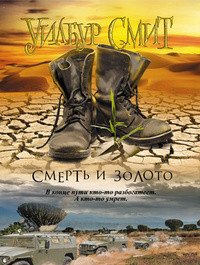Men of Men - Smith Wilbur (книги бесплатно без txt) 📗
"I see you, Gandang." His voice was throaty and low, the sadness still in it for he knew that he could not escape that way. He felt like a man on a solitary journey through the forest where the lions are hunting. His recognition released Gandang from his respectful silence.
The induna clapped his hands softly and began to recite his half-brother's ritual praises, and Loberigula's mind wandered back across the years.
His earliest memory was of the road, the hard road up from the south, driven by the mounted men dressed all in brown, riding brown ponies. He remembered the popping sound of the guns, which He learned only later to fear, and the smell of gunsmoke, spicy and sour as the wind brought it down to where he clung to his mother, and he remembered the wailing of the women as they mourned the dead.
He remembered the heat and the dust, trotting naked as a puppy at his mother's heels. How tall she had seemed, the muscles of her back gleaming with sweat, and Ningi, his sister, in the sling upon her hip, clinging to one of his mother's fat jostling breasts with mouth and tiny determined fists.
He remembered toiling up the stony hills with his father's single wagon rolling and pitching along ahead of them. On it rode Mzilikazi's senior wife, and her son Nkulumane, three years older than Lobengula and heir apparent to the kingship of the Matabele. They were the only ones who did not walk.
He remembered how his mother's back had with-tred, the beautiful gleaming skin becoming loose and baggy, the ribcage beginning to show through as the famine wasted her substance, and Ningi screaming with hunger as the rich creamy flow from her teats dried up.
This was where the memory of "Saala" began; it was mixed up at first with the shouting and singing as a band of raiding Matabele returned to the fleeing column. He had first seen Saala in the firelight, as the warriors slaughtered the captured cattle, and Lobengula could almost still feel the hot grease and the bloody juices of the beef running down his chin and dripping onto his naked chest as they feasted, breaking the long days and months of starvation on cattle taken from the white men, the buni.
Once his belly was bulging tightly with meat, Loberigula had joined the circle of curious Matabele princelings and princesses who surrounded the captives; but he had stood back from the teasing and jeering and prodding of the other children.
Saala was the eldest of the two little girls. It was only long afterwards that Lobengula learned that her name was Sarah, but even now he could not pronounce that sound. The Matabele raiding party had surprised a small an of Boer wagons, and had killed everybody except these two small white children.
Her whiteness was the first thing that had struck Lobengula. How white her face was in the firelight, as white as an egret's wing, and she had not wept as her younger sister wept.
After that the memories grew stronger, Saala walking ahead of him as the slow column wound through thick thorn forest. Saala taking the infant Ningi from his mother when she slipped and fell with weakness in the black mud of the swamps while the mosquitoes formed a dark whining cloud over them.
Exactly where Saala's little sister died, Lobengula could not recall. It might have been in the swamps. They left her small naked white body unburied, and the column marched on.
At last Lobengula's own mother fell and could not rise again, and with her last strength handed little Ningi to Saala; then she curled up quietly and died. All the weak ones died like that, and their infants died with them, for no other women would take the orphans, for each of them had her own infants to care for.
However, Saala strapped little Ningi on her own thin white back in the way that the Matabele carry their babies, then she took Lobengula's hand in hers and they toiled on -after the fleeing nation.
By now Saala's clothing had long ago fallen off her thin white body, and she was as the other Matabele girls who had not yet reached puberty, completely naked. She had half forgotten her own language, and spoke only the language of the tribe. The sun had darkened her skin, and the soles of her bare feet had grown a thick covering, hard as rhinoceros skin, so she could march over razor flint and needle thorns.
Lobengula came to love Saala, transferring everything he had ever felt for his mother to her, and she stole extra food for him and protected him from the bullying of his older brothers, from Nkulumane the cruel one, and from Nkulumane's mother, who hated all that might one day stand in the way of her son's claim to the kingship of the Matabele.
Then the Matabele crossed the Limpopo, the River of Crocodiles, and the land beyond was fair, thick with game and running with sweet rivers. The wandering nation followed Mzilikazi into the magical hills of the Matopos. There on a lonely hilltop the king met the wizard of the Matopos, face to face.
Mzilikazi saw fire spring up at the Umlimo's bidding, and he heard the spirits speak from the very air about the Umlimo, a hundred different voices, voice of infant and crone, of man and of beast, the cry of the fish eagle, the snarl of the leopard, and from that day the Umlimo had the reverence and superstitious awe of the king and all his people.
The Umlimo pointed the way north again, and as the Matabele emerged from the broken hills of the Matopos, they saw spread before them a beautiful land, rich with grass and tall trees.
"This is my land," said Mzilikazi, and built his kraal under the Hills of the Indunas.
However, the Matabele had lost nearly all their cattle and many of the women and children had died on that cruel journey northwards.
At Thabas Indunas Mzilikazi left his senior wife, mother of Nkulumane, as his regent, and he took five thousand of his finest warriors and went out against the tribes, for women and for cattle.
He went westwards into the land ruled by great Khatna, and there was no word from him. The seasons came and changed, the rains followed the long dryness, the heat followed the frosts, and still there was no word of Mzilikazi.
Slowly the strict order of Matabele society began to break up, for the regent, Mzilikazi's senior wife, was unrestrained in her intercourses, and she rutted shamelessly with her lovers.
Some of the lesser wives followed her example, and then the common people took sexual licence, the youths, unblooded and without the royal permission to go into the women, lay in wait for the young girls on the path to the water-hole, and dragged them giggling into the bushes.
With the code of morality broken, other vices followed. The remaining cattle, the breeding herds, were slaughtered, and the feasting went on for months. Loose ess and drunkenness swept through the nation like a plague, and in the midst of this debauchery, one of the Matabele patrols captured a little yellow Bushman who had wandered in out of the west, and the Bushman had momentous tidings.
Mzilikazi is dead" he told his captors. "I have thrust my own fingers into the stab wound in his heart, and watched the hyena wolfing down his flesh and cracking his bones."
The senior wife had her guards boil clay pots of water, and pour them over the Bushman until his flesh fell off his bones and he died, which is fitting treatment for one who brings news of the death of a king. Then she called the indunas into council, and urged them to proclaim Nkulumane king in place of his dead father. However, none of the indunas were fools. One whispered to the other, "It would take more than a Tswana dog to kill Mzilikazi."
While they procrastinated and talked, the senior wife grew wild with impatience and sent for the executioners, determined now that there would be no rival for her son.




